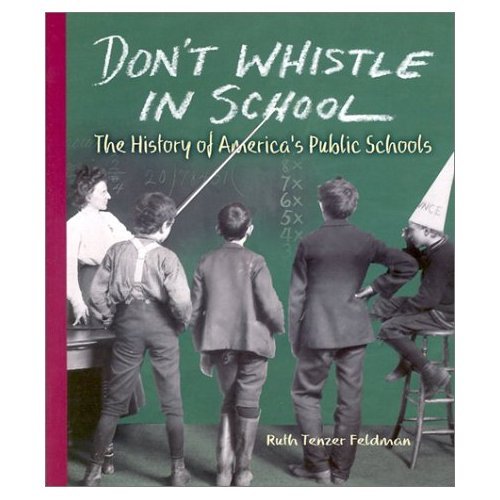この本が迷子になっていたら (2) If This Book Should Chance to Roam [Daddy-Long-Legs]
『あしながおじさん』1年目の7月にロック・ウィローからジュディーーが書いた手紙の中に、屋根裏に見つかった On the Trail という本の扉に書き込まれていた少年の殴り書きが引用されています。――
Jervis Pendleton
If this book should ever roam,
Box its ears and send it home.
「ジャーヴィス・ペンドルトン もしもこの本が迷子になるようなことがあったら、びんたをくれてやってウチに連れ返してね。」 これは、今から25年前の夏に、ジュディーと同級・同室のジュリア・ペンドルトンのおじさん――つまりDaddy-Long-Legsその人――が病気療養でロック・ウィローに滞在していたときに読んでいた冒険小説に書かれたもの。当時彼は11歳ぐらいでした。署名の下の2行の文は "roam" と "home" が韻を踏んで、四歩格の韻文になっています。〔「この本が迷子になっていたら (1) If This Book Should Ever Roam」 [Daddy-Long-Legs]〕
ルース・テンザー・フェルドマンという女性の『学校で口笛を吹くな――アメリカの公立学校〔公学校と訳してみようと思ったら、日本(語)では歴史的な意味があるのかしら〕の歴史』 という100ページ足らずの本の第1章「新世界のABC (New World ABCs)」に、18世紀後半に初版が出て長らくアメリカの小学校の教科書として用いられた『ニューイングランド初等読本 New England Primer』 についての一節があります。
Used in both church and school, primers were originally prayer books with an alphabet added. The most popular primer throughout the colonies was The New England Primer, which first appeared in about 1690. It included rhymed alphabets, religious essays and poems, and instructive questions and answers. Most homes had a copy of this primer; adults read it, too. Students had to buy their own primers, and they often wrote warnings like this one on the inside front page:
Isaac Greenwood is my name,
Steal not this book for fear of shame.
And if this book should chance to roam,
Just box its ears and send it home. [Ruth Tenzer Feldman, Don't Whistle in School: The History of America's Public Schools (Minneapolis: Lerner Publications, 2001), p. 12]
1690年ごろと書いてあるけれど、1683年が初版みたい(年表)。韻を踏んだ宗教的な詩行でアルファベットを教えたり、教義問答ふうというか、聖書に関するQ&A みたいなものを含んでピューリタニズムの教えを伝えるのにも力のあった教科書ですけれど、各家庭に一冊あって、大人もそれを読んだし、/〔ここのところのつながりがよくわかりませんが、たぶん意訳すると〕生徒たちはひとりひとりが教科書をもたねばならず、それで、しばしば扉に次のような注意書きをしたためた。――
アイザック・グリーンウッドが我が名前
この本を盗まんとする者は恥を知り給え
この本がたまたま迷子になっていた際
びんたをくれるだけで家まで送って下さい
New England Primer は改訂を加えながらも19世紀まで用いられる大ベストセラーですけれども、19世紀も後半になるとよかれあしかれ世俗的な読本が一般化するようになります(これについては機会があれば具体的に紹介するかもしれません)。
このフェルドマンの本は、どうやら小学校上級からの読み物として、児童向けないし青少年向けに書かれているようで、情報的に不確かなところがあるのですけれど――つまり、この書き込みはいつごろからあるのか、という点です――クリフトン・ジョンソン(1865-1940)という好事家が1904年に出版した『昔の学校と教科書』(ニューヨーク&ロンドン、マクミラン)には、18世紀末から19世紀前半の書き込みの実例が出てきます。途中をはしょりつつも、例が面白いので長めに引用します。――
The first thing the youthful proprietor of a book was likely to do was to mark it with his name. Usually he put his signature on the front fly-leaf, but he might write it on the final fly-leaf, or almost anywhere else in the book. Sometimes he lettered
A Signature. From a Dilworth's Schoolmaster's Assistant.
it outside on the cover, or even on the edges of the leaves. Various common forms of name inscriptions are given below. They exhibit considerable originality in spelling and in punctuation or the lack of it, and are transcribed just as they were written.
William Ornes 1779 〔たぶん Ornes = Orne's〕
Elisa Lee,s property 〔Lee, s = Lee's〕
cost of it 3/ Hartford ioth Dec 1798
Allen m Shepherds 〔m = M.〕
Book and pen the year
1831 augest 17 〔augest = August〕
Jonathan Colton owner 1807
Ella Morrill is my name 1828
Mifs Jane Elizabeth Smith her book 〔f じゃなくて long s でMiss です〕
Price 37 1/2 Cnts January 1st 1833 〔Cnts = Cents〕
Mifs Nottinghams Seminary for Young ladies
[. . .] Frequently the names were accompanied by verses such as :―
A Warning. From a Dwight's Geography, 1802.〔Steal not the [this] Book
For fear of Shame
For hear [here] you read
The owners [owner's] name
Asa Stabbin's Book〕
If this book should chance to roam
Box its ears and send it home.
Steal not this book, for if you do,
Tom Harris will be after you.
Steal not this book for fear of strife
For the owner carries a big jackknife.
Steal not this book my honest friend
for fear the gallos will be your end
The gallos is high, the rope is strong,
To steal this book you know is wrong. [Clifton Johnson (1865-1940), Old-Time Schools and School-Books (New York: Macmillan, 1904), pp. 152-154]
状況証拠でしかないのですけれど、 "Steal not this book/ For fear of shame" という、先の本で組み合わさっていた詩行が1802年のものとして出てくることなど考えると、遅くとも18世紀末には――前の記事に並べた例に見られるようにヴァリエーションをやがてふくらませつつも――一般化していた文句ではなかったのか、と思われ。『あしながおじさん』の設定では、1880年代だと想像されるのですが、そのとき既に少なくとも100年は書き続けられてきた文句ではなかったかと。
まだつづくかも
----------------------------------------------------
Learner Publications Group <http://www.lernerbooks.com/cgi-bin/books.sh/lernerpublishing.p>
Clifton Johnson, Old-Time Schools and School-Books (New York: Macmillan, 1904) : E-texts at Internet Archives <http://www.archive.org/search.php?query=Old-Time+Schools+and+School-Books+>





コメント 0